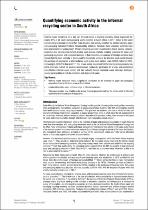JavaScript is disabled for your browser. Some features of this site may not work without it.
- ResearchSpace
- →
- Research Publications/Outputs
- →
- Conference Publications
- →
- View Item
| dc.contributor.author |
Godfrey, Linda K

|
|
| dc.date.accessioned | 2021-12-06T08:47:59Z | |
| dc.date.available | 2021-12-06T08:47:59Z | |
| dc.date.issued | 2021-11 | |
| dc.identifier.citation | Godfrey, L.K. 2021. Quantifying economic activity in the informal recycling sector in South Africa. <i>South African Journal of Science, 117(9/10).</i> http://hdl.handle.net/10204/12190 | en_ZA |
| dc.identifier.issn | 0038-2353 | |
| dc.identifier.issn | 1996-7489 | |
| dc.identifier.uri | https://doi.org/10.17159/sajs.2021/8921 | |
| dc.identifier.uri | http://hdl.handle.net/10204/12190 | |
| dc.description.abstract | Informal waste reclaimers are a key part of South Africa’s recycling economy, being responsible for around 51% of all paper and packaging waste collected in South Africa in 2017. Active in the waste and recycling landscape for more than three decades, their activity predates the earliest voluntary paper and packaging Extended Producer Responsibility schemes. However, these voluntary schemes have been instrumental in scaling South Africa’s recycling economy. Investment by brand owners, retailers, converters and recyclers has helped develop local end-use markets, creating a demand for paper and packaging recyclables and a resultant increase in their collection. An analysis of tonnage and price data shows that the mean estimate of money paid by the private sector to the informal waste sector through the purchase of recyclables at intermediaries such as buy-back centres, was ZAR625 million in 2012, increasing to ZAR872 million in 2017. This private sector ‘investment’ in the local recycling economy has led to direct and indirect job creation and improved livelihoods, particularly for a large, well-established and effective informal waste sector, and has indirectly funded municipal waste diversion strategies, saving municipalities in both the collection and disposal of waste. | en_US |
| dc.format | Fulltext | en_US |
| dc.language.iso | en | en_US |
| dc.relation.uri | https://sajs.co.za/article/view/8921 | en_US |
| dc.source | South African Journal of Science, 117(9/10) | en_US |
| dc.subject | Informal waste reclaimers | en_US |
| dc.subject | Waste disposal | en_US |
| dc.subject | Recycling economy | en_US |
| dc.subject | Extended Producer Responsibility | en_US |
| dc.subject | EPR | en_US |
| dc.title | Quantifying economic activity in the informal recycling sector in South Africa | en_US |
| dc.type | Article | en_US |
| dc.description.pages | 7 | en_US |
| dc.description.note | Published under a Creative Commons Attribution 4.0 International Licence | en_US |
| dc.description.cluster | Hosted National Programmes | en_US |
| dc.description.impactarea | Office Of Waste Management | en_US |
| dc.identifier.apacitation | Godfrey, L. K. (2021). Quantifying economic activity in the informal recycling sector in South Africa. <i>South African Journal of Science, 117(9/10)</i>, http://hdl.handle.net/10204/12190 | en_ZA |
| dc.identifier.chicagocitation | Godfrey, Linda K "Quantifying economic activity in the informal recycling sector in South Africa." <i>South African Journal of Science, 117(9/10)</i> (2021) http://hdl.handle.net/10204/12190 | en_ZA |
| dc.identifier.vancouvercitation | Godfrey LK. Quantifying economic activity in the informal recycling sector in South Africa. South African Journal of Science, 117(9/10). 2021; http://hdl.handle.net/10204/12190. | en_ZA |
| dc.identifier.ris | TY - Article AU - Godfrey, Linda K AB - Informal waste reclaimers are a key part of South Africa’s recycling economy, being responsible for around 51% of all paper and packaging waste collected in South Africa in 2017. Active in the waste and recycling landscape for more than three decades, their activity predates the earliest voluntary paper and packaging Extended Producer Responsibility schemes. However, these voluntary schemes have been instrumental in scaling South Africa’s recycling economy. Investment by brand owners, retailers, converters and recyclers has helped develop local end-use markets, creating a demand for paper and packaging recyclables and a resultant increase in their collection. An analysis of tonnage and price data shows that the mean estimate of money paid by the private sector to the informal waste sector through the purchase of recyclables at intermediaries such as buy-back centres, was ZAR625 million in 2012, increasing to ZAR872 million in 2017. This private sector ‘investment’ in the local recycling economy has led to direct and indirect job creation and improved livelihoods, particularly for a large, well-established and effective informal waste sector, and has indirectly funded municipal waste diversion strategies, saving municipalities in both the collection and disposal of waste. DA - 2021-11 DB - ResearchSpace DP - CSIR J1 - South African Journal of Science, 117(9/10) KW - Informal waste reclaimers KW - Waste disposal KW - Recycling economy KW - Extended Producer Responsibility KW - EPR LK - https://researchspace.csir.co.za PY - 2021 SM - 0038-2353 SM - 1996-7489 T1 - Quantifying economic activity in the informal recycling sector in South Africa TI - Quantifying economic activity in the informal recycling sector in South Africa UR - http://hdl.handle.net/10204/12190 ER - | en_ZA |
| dc.identifier.worklist | 25141 | en_US |






